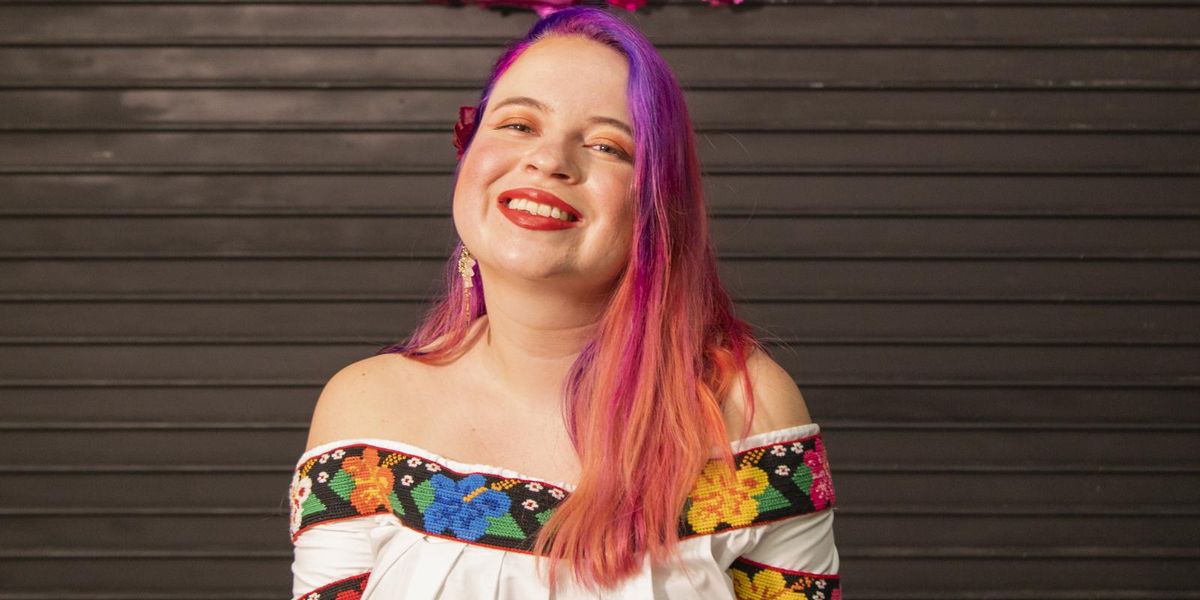Popular Reads
In The Community
The road to success for an entrepreneur is often a rollercoaster. Just getting started is often scary and daunting. As Latinas, many of us tend to inherit the "scarcity mentality" and our families and friends who often mean well, discourage us from setting off on a path different from their own. They say things like it's not dependable, or it's too hard, or what if we fail? Despite that, Latinas are now, more than ever, building successful businesses and have been leading the way for several years now.
And despite those great entrepreneurial numbers, we still lack mentors, resources, and role models.
Enter stage right: Ashley K. Stoyanov Ojeda authored "Jefa in Training," and the name suits her and this community perfectly. The spanglish guide is composed of intimate conversations with a wide range of Latinas and women of color to explore a world of entrepreneurship that will encourage you to chase that dream that you've obsessively been envisioning.
It also includes valuable tools and materials. Ojeda explains, "Whether a solopreneur or startup founder, this colorful compendium of lessons, interviews, and worksheets, is everything you need to take your side hustle to the next level, start working for yourself, and turn your ideas into something much bigger."
Luz talked with the business madrina on the eve of her book, which premiered on 2/22/22.
This interview has been lightly edited for clarity and flow.
What inspired you to write "Jefa in Training?
I was inspired to write Jefa in Training because I recognized a lack of resources for entrepreneurs by people I had things in common with. I noticed this gap when I was first starting to navigate the world of entrepreneurship and once I started working closely with other Latinas in The Mujerista Network, I noticed that they felt the same way. I wanted to create a resource that we all felt we needed - an approachable yet efficient toolkit that included a variety of different perspectives and actionable steps. "Jefa in Training" became that and more.
What part of the book was the most fun to write, and what part was the most challenging?

I had a really great time writing most of the chapters! The one that gave me the most trouble was the finance chapter and truthfully, I would not have been able to do it without my fantastic collaborator Vanessa Duran, Founder/CEO of DCC Accounting. In that chapter, she shares her framework, the One-Page Financial Plan, and all of the things to consider while building it. It's one of the most important things for any entrepreneur to understand, and it also can be one of the most overwhelming parts of building any business. We put together this chapter in a way for it to be approachable with the hopes that it will help many!
What would you say to an entrepreneur who is thinking of getting the book; how will it help in their journey?
"Jefa in Training" will help them build the roadmap they need to launch their business. The book was written so that yes, you can read it front to back, complete all the worksheets and at the end have a business plan - however, if you already have an idea and have been in business for some time, at the end of the day it's a toolkit as well. That means that you don't actually have to read the whole book to benefit from it! If you think you need help developing your USP, there's a chapter and framework for that; if you need help developing your sales strategy, there's a chapter and framework for that as well. Not only will it help them take actionable steps because of the workbook format, but it also will provide inspiration as they read the tips and stories from other successful Latinas throughout the chapters.
What perspectives or beliefs have you challenged with this work?
At some point in our lives, we all experience imposter syndrome and writing this book was actually the first time I experienced it first hand. It wasn't until I was writing the part about imposter syndrome that I realized why I was feeling this way.
"The reason that imposter syndrome exists is that more people like you aren't doing what they want to do. By doing what makes you afraid or anxious, you are breaking the cycle."
And just like that, I realized I needed to indeed break the cycle. I needed to write this book to inspire the next generation of Latinas to launch businesses and write books. I had to lead by example.
You're known as the business Madrina; how was the nickname born?

A longtime client of mine in the music industry once called me her fairy godmother, and at the time, I laughed it off. Once I started coaching more and more, I realized that she wasn't quite far off with that joke. My main goal is to not just coach entrepreneurs but to also help them get the resources they need (whether it be knowledge, network, funds, emotional support - whatever!). I never want to say "no, I can't help you" to someone. My vision is that I will indeed be able to go wave my magic wand and if I can't help them, connect them with someone who can.
Without giving too much away, please share a favorite quote from the book. Why did this quote stand out for you?
In the "Lessons Learned" part of the book, Julissa Prado (Rizo's Curls), says, "Just because something hasn't been done before doesn't mean it's not possible. Don't be afraid to do things differently." That really stands out for me because so many of us grew up thinking that being "different" is bad - when in reality, I truly see that through our differences, we can find our strengths (hence the chapter "Ser Diferente Es Ser Fuerte").
In closing, is there anything you would like to say to the Luz audience reading this article?
By taking the step of starting your own business, you've also participated in bettering the entrepreneurial landscape for women like us—and that is how we create real change. And I would be honored to have "Jefa in Training" be the tool that helps you launch. And I'm always a DM away if you need me :) Gracias!
Don't walk; run to buy this book if you've been thinking of going solo or are on your way to start a business. It'll become another tool in your toolbox on your entrepreneurial journey. You can purchase the book at: https://www.ashleykstoyanov.com/jefa-in-training
- 5 Books Written by Latino Authors Worth Reading in 2022 ... ›
- Does Hustle Culture Have it All Wrong? - Luz Media ›
Generally speaking, family is significant in Latino culture. Our traditions and customs usually involve lots of family and family time. Even extended families like second cousins are important and influential people in our lives. Often when you come from these Latino family dynamics, you may find yourself feeling like you have to live up to all the different standards set for you, which of course, can end up becoming severe sources of stress.
Today's world is very different from the world our grandparents and even parents grew up in. The concept of what a "family" looks like is undoubtedly dated; however, the changing dynamics of family are complex concepts for older generations to grasp. For example, having children and giving your parents the nietos and nietas they dreamed of their whole parenting lives was considered a given.
There are now Latino parents everywhere grappling with the fact that they might not ever get grandchildren, or they might have to "settle" for only one or two.
The changing attitude towards procreation extends beyond the Latino family, with a recent Pew Research Center study reporting that more adults say they don't intend on having kids ever. About 44% of those surveyed between the ages of 18 and 49 reported that it's unlikely or "not too likely" that they'll have children. This percentage is up from a 2018 survey where 37% reported the same.
For Latinas, the pressure to have a plan for children can feel even more overwhelming in a culture holding on to antiquated ways. And in many instances, it is our matriarchs who want to burden their daughters with the responsibility of children, despite their daughters indicating that they have other priorities. These women effectively uphold the patriarchy often without knowing it.
Our matriarchs cite many different reasons for the continuous pressure on their daughters to have children. Those reasons include carrying on a "legacy" for the family, although the pressure to carry the family name often falls on the sons. There's the "practical" reason children are necessary because they will later become responsible for taking care of their parents when they get older, essentially becoming the parent's retirement plans. This highly damaging belief ends up creating an enormous burden on their eventual adult children as succinctly noted by journalist Tina Vasquez.
Ultimately no one should feel forced to have children, much less when it's motivated by the wants and opinions of your family. But by understanding where these beliefs come from, we can make educated decisions about our own lives that aren't influenced by family pressure.
For newer generations of Latina-Americans, we have to normalize that some people simply want things other than kids. Ella Alexander writes, "The most offensive of sayings? You'll never feel true love until having children." We agree.
- Ditching ‘Y El Novio’ Culture, Once and For All ›
- Luz Media ›
- Luz Media ›
- Latinas Marrying less as Men Struggle - Luz Media ›



